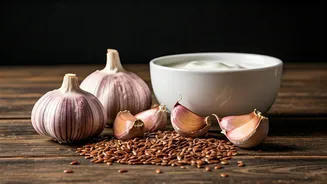Introduction to Dandruff
Dandruff, a common condition affecting the scalp, is characterized by the shedding of dead skin cells. While many factors can contribute, from dry skin to fungal
infections, natural remedies offer a gentle approach to manage and reduce its appearance. Before diving into specific treatments, it is essential to understand the underlying causes and identify the most appropriate solutions. These natural methods, when used consistently, can help in maintaining a healthy scalp environment.
Yogurt for Scalp Health
Yogurt, with its probiotic properties, is a great option in the fight against dandruff. The lactic acid present in yogurt helps in gently exfoliating the scalp, removing dead skin cells and encouraging a healthier environment for hair growth. In addition, the probiotics can help regulate the scalp's microbiome, reducing inflammation and combating the yeast that contributes to dandruff. Applying plain, unsweetened yogurt directly to the scalp and leaving it for about 20 minutes before rinsing can provide relief and promote scalp health. Regular use can reduce flakiness and itching.
Coconut Oil's Moisturizing Power
Coconut oil is a natural moisturizer that can combat the dryness often associated with dandruff. Its ability to penetrate the hair shaft and scalp helps to soothe and hydrate the skin, reducing flaking and itching. Furthermore, coconut oil has antifungal properties that can help to control the overgrowth of Malassezia, a yeast that can worsen dandruff. Gently massaging warm coconut oil into the scalp can provide relief and improve the overall condition of the scalp. Leave it on for at least 30 minutes, or even overnight, for deeper moisturization. Regular use of coconut oil contributes to a healthier scalp and more manageable hair.
Flaxseeds for Scalp Nourishment
Flaxseeds, rich in omega-3 fatty acids, play a crucial role in maintaining scalp health by reducing inflammation and supporting skin hydration. These fatty acids help to nourish the scalp, reducing dryness and flakiness. The use of flaxseed oil or a flaxseed gel on the scalp helps to moisturize and soothe the skin. Regular consumption of flaxseeds also aids overall health, indirectly supporting a healthy scalp. By incorporating flaxseeds into your routine, you can create an environment that minimizes dandruff and promotes a healthier scalp.
Amla's Antifungal Properties
Amla, also known as Indian gooseberry, contains antifungal properties that are beneficial in combating dandruff. Its high vitamin C content provides antioxidant support and helps strengthen the scalp. Amla’s natural properties can help control the underlying causes of dandruff, while also providing nutrients to the hair follicles. Mixing amla powder with water to create a paste and applying it to the scalp before washing your hair can lead to a healthier scalp. Consistent use of amla can help to reduce dandruff and improve hair health, contributing to an environment that promotes healthy hair growth.
Lemon's Exfoliating Action
Lemon, with its acidic properties, serves as a natural exfoliator, helping to remove dead skin cells and reduce dandruff. Its cleansing action also helps in reducing the build-up of oils on the scalp, which can contribute to dandruff. The application of diluted lemon juice can provide relief from flakiness and itching. Always dilute lemon juice with water to prevent irritation, and use it with caution if you have sensitive skin or open cuts on your scalp. Applying lemon juice before shampooing and rinsing thoroughly can help to cleanse the scalp and reduce dandruff. The consistent use of lemon in your hair care routine can support a healthier scalp.



















